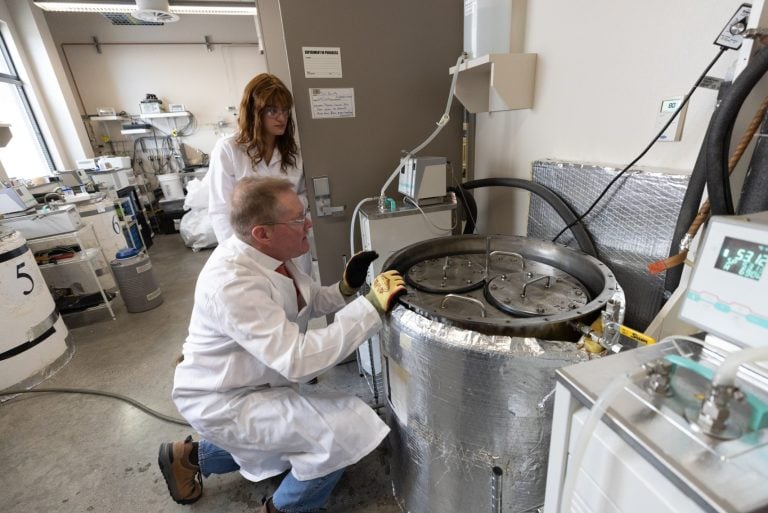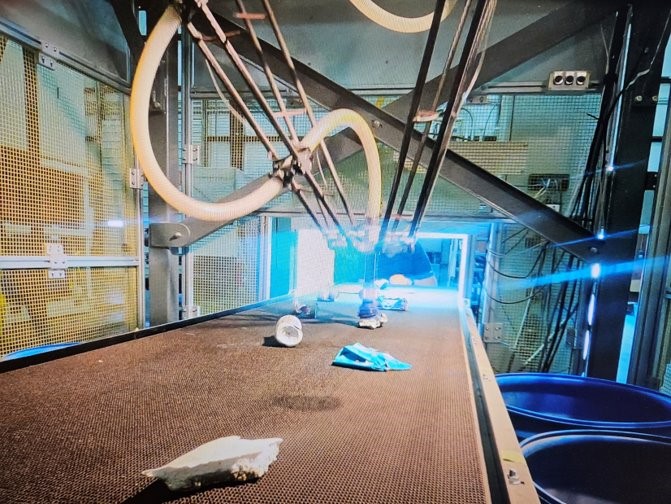INL News | Integrated Energy
Every day, INL’s talented scientists and engineers discover new technologies that improve energy efficiencies, develop stronger materials, and lead us to a more secure tomorrow.
With their efforts, the nation will…
- See an increase in hydrogen as a reliable and affordable source of power
- Increase the domestic extraction and production of critical materials needed for economic prosperity and national security
- Turn household waste into biofuel
Research Areas
Integrated Energy Systems
Systems Analysis & Decision Sciences
Other Capabilities
Deployable infrastructure systems
INL’s deployable infrastructure systems, such as the Microgrid in a Box, are designed to provide reliable power solutions for various applications, including defense, utilities and disaster relief. These systems integrate multiple energy sources, including solar, wind, and hydropower to ensure continuous power supply even in remote or off-grid locations.
For more information contact Kurt Myers.

Energy Economics
INL excels in conducting comprehensive technoeconomic analyses to evaluate the feasibility and economic viability of various technologies. Utilizing advanced tools like the Framework for Optimization of Resources and Economics (FORCE), INL integrates technical performance data with economic models to assess the potential of integrated energy systems. This capability helps identify optimal configurations and strategies for deploying new technologies, ensuring they are both technically sound and economically viable.
For more information contact Thomas Mosier.

Environmental Biology
INL has long used environmental organisms to tackle complex challenges. These organisms can catalyze the breakdown of simple and complex chemicals, improve reaction kinetics, oxidize or reduce metals, and sequester toxic compounds. At INL, they’re applied to extract critical metals, support or study uranium production, separate valuable elements, break down biomass for fuel, remediate pollutants, and improve biomass storage.
For more information, contact [email protected].

Mechanical Material Processing & Deconstruction
The Idaho National Laboratory (INL) is at the forefront of mechanical material processing and deconstruction. Through its Process Development Unit (PDU), INL offers advanced capabilities for grinding, drying, pelletizing, and separating materials, which are essential for bioenergy and biochemical production. Additionally, INL’s innovative technologies in bale deconstruction and material flow management help reduce variability and improve efficiency in processing feedstocks.
For more information contact Lynne Coe-Leavitt.

Radioactive material disposal
INL is a leader in recovering and disposing of orphaned radioactive materials across North America as part of the U.S. Department of Energy’s National Nuclear Security Administration mission. The INL Radiological Security Source Disposition team works with federal agencies, state regulators, and local governments to identify and safely transport excess radioactive sources from hospitals and industrial facilities to licensed disposal sites. This initiative has successfully recovered over 1.3 million curies of radioactive materials, addressing various logistical and safety challenges while enhancing national security and public health.
For more information contact Pamela Crane.

Robotics and autonomous systems
INL has two artificial intelligence-powered automated sorters that can be trained to identify objects based on unique visual and spectroscopic signatures. These sorters are equipped with visual, near-infrared, mid-infrared and 3D cameras, and refractory X-ray fluorescence spectrometer that can identify specific items or items enriched in certain elements. Following identification, automated sorting systems mechanically or pneumatically pick out the desired items.
Watch the sorting system in action in this video.
For more information contact Jeff Lacey.

Utility and grid capabilities
INL is a leader in advancing utility and grid capabilities by integrating alternative energy sources with traditional power systems. Through its Power and Energy Real-Time Laboratory (PERL), INL models and simulates complex grid interactions to improve reliability and efficiency. Additionally, INL’s work on microgrids and electric vehicle integration helps create a more secure energy future.

Facilities
INL researchers are studying ways to provide practical energy options for people and industries, including microgrid systems, water treatment capabilities and reliable chemical production. Their work combines world-class technologies to bring more secure solutions into today’s industrial landscape.
Our People
The Integrated Energy Team at Idaho National Laboratory (INL) is a dedicated group of experts focused on advancing innovative energy solutions to enhance the reliability, efficiency and security of the nation’s energy systems. This multidisciplinary team collaborates on cutting-edge research and development projects that integrate diverse energy sources, including nuclear, alternative and fossil fuels, to create comprehensive, secure energy systems. Their work encompasses a wide range of activities, such as developing advanced energy storage technologies, optimizing grid operations, and creating smart energy infrastructure. By leveraging INL’s state-of-the-art facilities and expertise, the Integrated Energy Team plays a pivotal role in driving the transition towards a more secure energy future.
Fact Sheets
Frequently Asked Questions
What role does INL play?
INL researchers develop new systems, tools and techniques to secure America’s energy dominance. INL’s contributions include fast-charging batteries for electric vehicles, biofuel production, integrated energy systems that will increase reliability of the electrical grid, recycling and waste management, new materials science and more.
Where does INL research impact the environment?
Our research focuses on things like microgrids for fast-charging vehicles, energy-efficient solutions for recycling electronic devices and approaches for a more holistic use of alternative energy sources. The work we do at INL advances the nation’s goal of energy security and dominance.
How does better energy efficiency affect our lives?
As the global population grows, so do our demands on the planet. Access to affordable, abundant energy is a key enabler of improved quality of life and sustained economic prosperity. That’s why INL is creating better ways to provide electricity, fuel vehicles and manufacture goods that use less energy and fewer harsh chemicals that create harmful byproducts. These efforts will lead to cleaner air and water, providing all living things the chance for a long, healthy future.
Does recycling still have a place?
Recycling household waste, worn clothing, used electronics, industrial wastewater and other byproducts contribute to a secure energy efficient future. Recycling also helps the U.S. rely less on foreign trade for materials and goods that cannot be domestically sourced. Every little bit makes a difference, so while you continue to recycle at home, we will continue to research technologies that make recycling more economical, energy efficient and socially responsible.
What will new transportation innovations will contribute?
INL researchers are advancing vehicle technology, from improving electric vehicle charging, to microgrid technologies that reduce burden on the electrical grid, to fuel cell technology where the only byproduct is water. Further, INL’s on-the-road vehicle systems analysis and data integration make it possible to validate and improve industry designs while helping establish U.S. and international standards for testing, regulation and performance.
Why is battery research crucial?
Energy storage is a crucial component when integrating continuous energy resources with the electrical grid. Batteries allow for electricity to flow when intermittent power sources, like wind and solar, are idle. Battery efficiency is important for electric vehicles to drive farther between charges. Plus, safety is a concern for all aspects of battery use. INL researchers analyze and improve on battery technology every step of the way, from safe practices to improved design and manufacturing.
How does our energy research support the electrical grid?
Today’s electrical grids are the primary way to deliver electricity to households and businesses. The new energy sources coming online will challenge the grid in new ways. For example, continuous sources such as wind are intermittent and can drop off without notice. Grids with more sources of continuous energy can be technically and economically challenging to stabilize. Advances will be critical for making the future grid reliable and resilient. For example, “shock absorbers” such as energy storage systems can help minimize brownouts or power surges. At INL, we reduce risks to the grid by testing new technologies in the lab before they are used in the field.
What is bioenergy?
Bioenergy is produced by using organic materials like algae, lumber byproducts, inedible crops, municipal waste and manure. Refineries process these raw materials, called biomass, to create solid or liquid fuels that can be burned to create electricity. INL has a state-of-the-art facility that troubleshoots supply systems to efficiently deliver large quantities of biomass.
Not finding what you are looking for? Please send your question to [email protected].
